人教新目标(Go for it)版八年级下册 Unit 8 Have you read Treasure Island yet?Section A Grammar Focus-4c 课件 (共24张P
文档属性
| 名称 | 人教新目标(Go for it)版八年级下册 Unit 8 Have you read Treasure Island yet?Section A Grammar Focus-4c 课件 (共24张P | 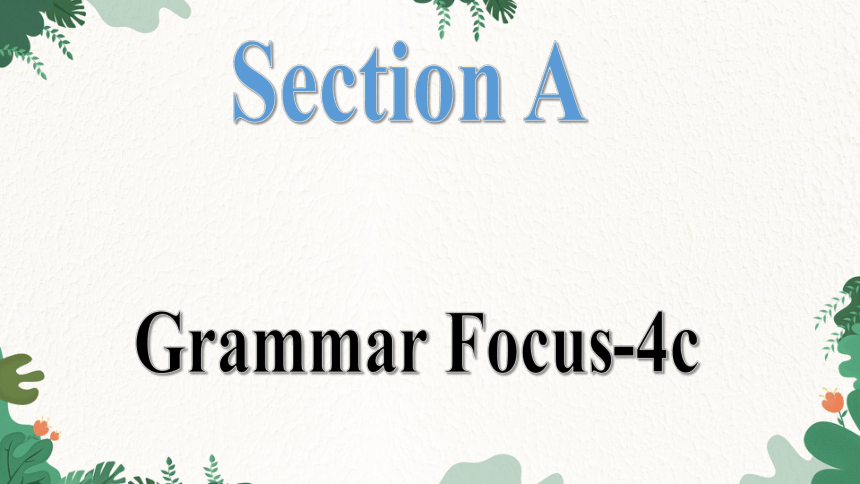 | |
| 格式 | pptx | ||
| 文件大小 | 3.0MB | ||
| 资源类型 | 教案 | ||
| 版本资源 | 人教新目标(Go for it)版 | ||
| 科目 | 英语 | ||
| 更新时间 | 2023-06-29 22:03:30 | ||
图片预览

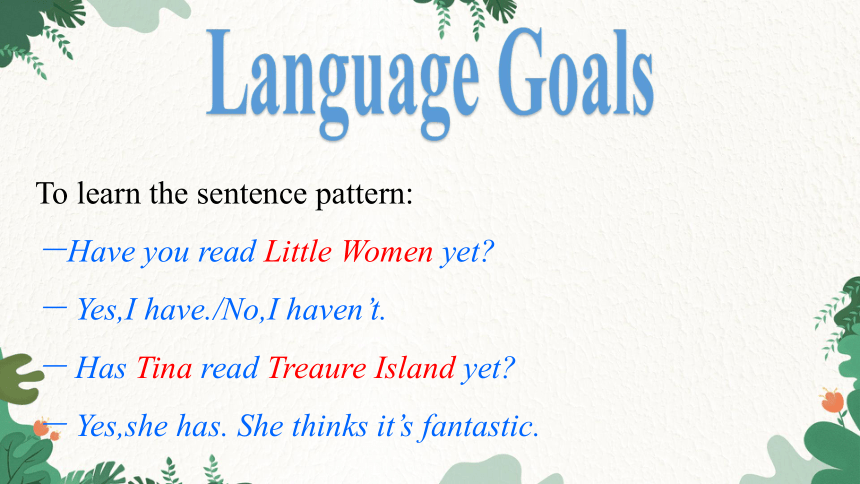
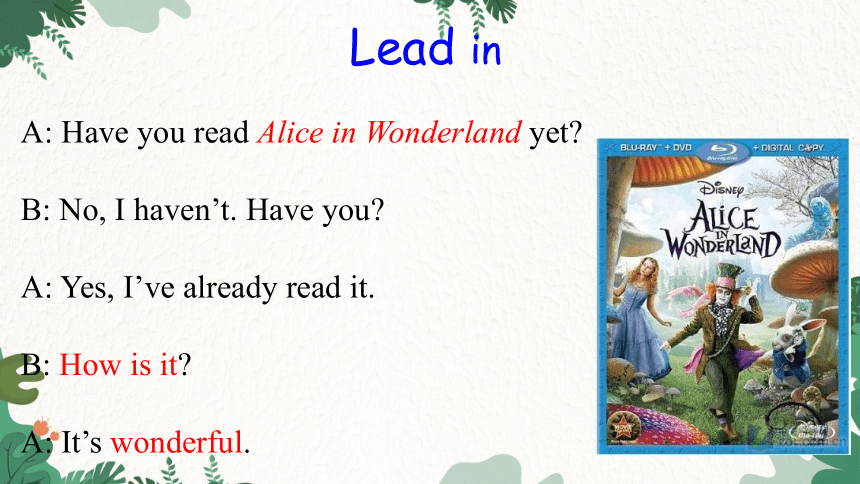


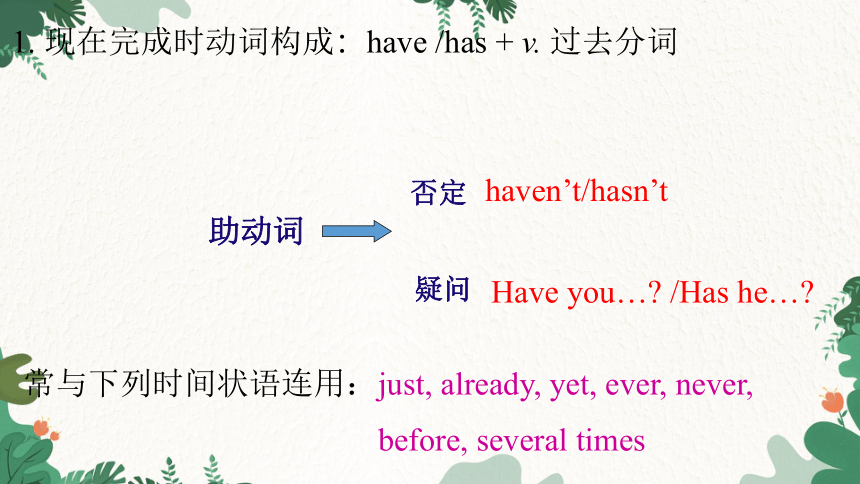
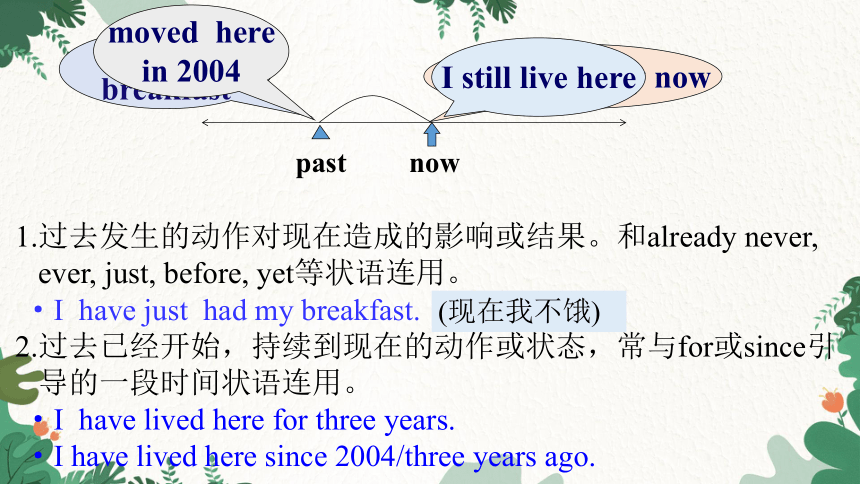
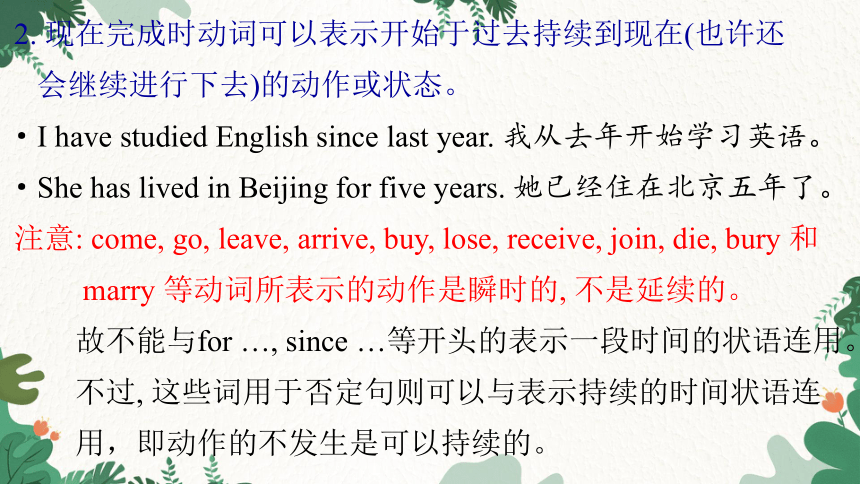
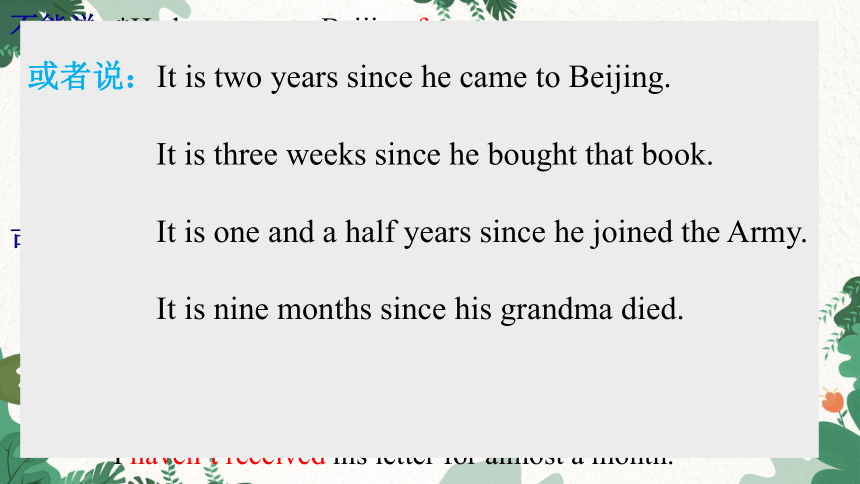
文档简介
(共24张PPT)
Section A
Grammar Focus-4c
To learn the sentence pattern:
-Have you read Little Women yet
- Yes,I have./No,I haven’t.
- Has Tina read Treaure Island yet
- Yes,she has. She thinks it’s fantastic.
Language Goals
A: Have you read Alice in Wonderland yet
B: No, I haven’t. Have you
A: Yes, I’ve already read it.
B: How is it
A: It’s wonderful.
Lead in
Grammar Focus
Have you read Little Women yet Yes, I have./No, I haven’t.
Has Tina read Treasure Island yet Yes, she has.
She thinks it’s fantastic.
Have you decided which book to write about yet Yes, I have. I’ve already finished reading it. It was really good.
现在完成时:
表示过去发生或已经完成的某一动作对现在造成的影响或结果,或从过去开始一直延续到现在的动作或保存的状态。
结构: 主语 + have / has + 动词的过去分词
一般疑问句: Have / Has…
Yes, I have. No, I haven’t.
Yes, she has. No, she hasn’t.
1. 现在完成时动词构成:have /has + v. 过去分词
助动词
否定
haven’t/hasn’t
疑问
Have you… /Has he…
常与下列时间状语连用:just, already, yet, ever, never,
before, several times
1.过去发生的动作对现在造成的影响或结果。和already never,
ever, just, before, yet等状语连用。
·I have just had my breakfast.
2.过去已经开始,持续到现在的动作或状态,常与for或since引
导的一段时间状语连用。
·I have lived here for three years.
·I have lived here since 2004/three years ago.
have had
breakfast
(现在我不饿)
I’m not hungry now
moved here
in 2004
I still live here
now
past
2. 现在完成时动词可以表示开始于过去持续到现在(也许还
会继续进行下去)的动作或状态。
·I have studied English since last year. 我从去年开始学习英语。
·She has lived in Beijing for five years. 她已经住在北京五年了。
注意: come, go, leave, arrive, buy, lose, receive, join, die, bury 和
marry 等动词所表示的动作是瞬时的, 不是延续的。
故不能与for …, since …等开头的表示一段时间的状语连用。
不过, 这些词用于否定句则可以与表示持续的时间状语连
用,即动作的不发生是可以持续的。
不能说: *He has come to Beijing for two years.
*He has bought that book for three weeks.
*He has joined the Army for one and a half years.
*His grandma has died for nine months.
* I have received his letter for a month.
可以说:
He has been in Beijing for two years.
He has had that book for three weeks.
He has been in the army for one and a half years.
His grandma has been dead for nine months.
I haven’t received his letter for almost a month.
或者说:It is two years since he came to Beijing.
It is three weeks since he bought that book.
It is one and a half years since he joined the Army.
It is nine months since his grandma died.
3. 现在完成时把过去的动作和现在的结果联系起来,
一般过去时只限于表示过去的动作本身, 与现在的结果无关。
现在完成时与一般过去时在意义上的区别举例如下:
·I have cleaned my room. (My room is clean now.)
我已经打扫过我的房间了。(我的房间现在很干净)
·I cleaned my room last week. (I did it in the past.)
我上周打扫了我的房间。(强调我是在上周打扫的)
·Father has gone to Amoy. (He is not here now.)
爸爸已经去厦门了。(去了还没回来)
·They have bought a dictionary. (They have a dictionary now.)
他们买了一本字典。(现在他们有字典了)
注意: 现在完成时不能和明确指出时间的状语(如: yesterday,
last year, in 1976, two days ago, just now, when she came in 等)
连用。可以和不明确指出时间的状语(如: already, yet, ever,
never, always,sometimes, often, before, once, twice, recently,
lately等)连用;也可以和表示包括现在在内的时间状语
(如: today, this morning, this week, this year等)连用。
(1) for + 表示一段时间的短语
(2) since + 表示过去时间点的词语
(3) since + 表示过去时间的时间状语从句
·I have been a teacher ______ a year.
He has been at this school _______ 1992.
We have learned 1,000 English words ______ we came to this school.
for
since
since
现在完成时句中常见的时间状语
A. 表示从过去一直持续到现在, 不能是具体的过去时间。
· Have you ______ been to Japan
I have ______ finished my homework.
I have finished my homework ______.
I haven’t finished my homework _________.
B. just, already, yet, before/ever, never有此类副词时,常强
调动作完成,不强调动作的持续.
ever
just
yet
already
already “已经”; yet “仍然; 还”这两个副词常常用于完成
时态, 其中already常用于肯定句, yet常用于否定句和疑问句。
·Jim has already finished his work.
吉姆已经把他的工作做完了。
·Haven’t you read The Call of the Wild yet
你还没读过《野性的呼唤》吗?
4. 现在完成进行时和现在完成时都可以表示“从过去开始一
直持续到现在”这一概念, 有时两者可以互相代用, 但前者
多用于口语。在含义上如果着重表示动作的结果时, 多用
现在完成时;如果着重表示动作一直在进行, 即动作的延续
性时, 则多用现在完成进行时。
一般不能用于进行时的动词也不能用于现在完成时行时。
现在完成时:表示过去发生或已经完成的某一动作对现在造成的影响或结果,或从过去开始一直延续到现在的动作或保存的状态,强调的是现在的情况,不能和表示过去的时间状语连用(如:in 1990,last Sunday 等)。
一般过去时:一般过去时只表示过去的动作或状态,和现在不发生关系(即动作或状态在现在已经结束),可以和表示过去的时间状语连用。
现在完成时与一般过去时的区别:
1. A: Would you like something to drink
B: No, thanks. ______________________. (just/drink some tea)
2. A: I heard you lost your key. __________________ (find)
B: No, not yet.
3. A: Do you know when Tom is leaving
B:___________________. (already/leave)
A: When _______________ (leave)
B: This morning.
I’ve just drunk some tea
Have you found it
He has already left
4a
Use the words in brackets to complete the conversations.
did he leave
4. A: Is your sister going to the movies with us tonight
B: No. _________________________. (already/see the film)
5. A: What do your parents think about our plan
B: I ____________________. (not/tell them/yet)
She has already seen the film
have not told them yet
Sally _______ (love) reading. In the morning, she reads the newspaper and in the evening she reads books. She _____ already ______ (read) more than 100 different books! Her favorite kind of books is science fiction. She is interested in science and technology and loves to imagine what the world _______ (be) like in 50 years. She _________ (finish) reading a book about robots last week and ___________ (write) a book report about it next week for her French class. Every time she is in the library, Sally looks at the many books she ____________ (not read) yet and she can’t wait to read them!
loves
has
4b
Fill in the blanks with the correct forms of the words in brackets.
will be
finished
will write
has not read
read
A: What books have you already read
B: I’ve already read Tom Sawyer and Harry Potter.
A: What do you think of them
B: Well, I think Harry Potter was exciting, but Tom Sawyer was a bit boring.
4c
Complete the chart with information about you and a friend.
You Your friend Comments
Books I have already read
Movies I have already seen
Songs I have already heard
1.I borrowed the library book two days ago.
I _______ _______the library book________ two days.
2.The meeting started ten minutes ago.
A: The meeting ______ ______ _____ ______ ten minutes ago.
B: The meeting ______ ______ _____ _______ ten minutes.
3.My brother joined the Party last year.
A: My brother ______ _____ _____ the Party since last year.
B: My brother ______ _____ _____ Party member since last year.
句型转换
have kept for
has been on since
has been on for
has been in
has been a
Exercises
4.He left Nanjing two years ago.
He ______ _______ _______ _______ Nanjing for two years.
5. That dog died last month.
That dog _______ ________ ________ since last month.
6. He has had the bike for two years.
A: Two years ______ ________ since he ________ the bike.
B: It’s ______ __________ since he _________ the bike.
C: He _______the bike two years __________.
has been away from
has been dead
has passed bought
two years bought
bought ago
Try your best to learn more about the usage of has/have done.
Then make conversations with the books’ name in this unit.
Section A
Grammar Focus-4c
To learn the sentence pattern:
-Have you read Little Women yet
- Yes,I have./No,I haven’t.
- Has Tina read Treaure Island yet
- Yes,she has. She thinks it’s fantastic.
Language Goals
A: Have you read Alice in Wonderland yet
B: No, I haven’t. Have you
A: Yes, I’ve already read it.
B: How is it
A: It’s wonderful.
Lead in
Grammar Focus
Have you read Little Women yet Yes, I have./No, I haven’t.
Has Tina read Treasure Island yet Yes, she has.
She thinks it’s fantastic.
Have you decided which book to write about yet Yes, I have. I’ve already finished reading it. It was really good.
现在完成时:
表示过去发生或已经完成的某一动作对现在造成的影响或结果,或从过去开始一直延续到现在的动作或保存的状态。
结构: 主语 + have / has + 动词的过去分词
一般疑问句: Have / Has…
Yes, I have. No, I haven’t.
Yes, she has. No, she hasn’t.
1. 现在完成时动词构成:have /has + v. 过去分词
助动词
否定
haven’t/hasn’t
疑问
Have you… /Has he…
常与下列时间状语连用:just, already, yet, ever, never,
before, several times
1.过去发生的动作对现在造成的影响或结果。和already never,
ever, just, before, yet等状语连用。
·I have just had my breakfast.
2.过去已经开始,持续到现在的动作或状态,常与for或since引
导的一段时间状语连用。
·I have lived here for three years.
·I have lived here since 2004/three years ago.
have had
breakfast
(现在我不饿)
I’m not hungry now
moved here
in 2004
I still live here
now
past
2. 现在完成时动词可以表示开始于过去持续到现在(也许还
会继续进行下去)的动作或状态。
·I have studied English since last year. 我从去年开始学习英语。
·She has lived in Beijing for five years. 她已经住在北京五年了。
注意: come, go, leave, arrive, buy, lose, receive, join, die, bury 和
marry 等动词所表示的动作是瞬时的, 不是延续的。
故不能与for …, since …等开头的表示一段时间的状语连用。
不过, 这些词用于否定句则可以与表示持续的时间状语连
用,即动作的不发生是可以持续的。
不能说: *He has come to Beijing for two years.
*He has bought that book for three weeks.
*He has joined the Army for one and a half years.
*His grandma has died for nine months.
* I have received his letter for a month.
可以说:
He has been in Beijing for two years.
He has had that book for three weeks.
He has been in the army for one and a half years.
His grandma has been dead for nine months.
I haven’t received his letter for almost a month.
或者说:It is two years since he came to Beijing.
It is three weeks since he bought that book.
It is one and a half years since he joined the Army.
It is nine months since his grandma died.
3. 现在完成时把过去的动作和现在的结果联系起来,
一般过去时只限于表示过去的动作本身, 与现在的结果无关。
现在完成时与一般过去时在意义上的区别举例如下:
·I have cleaned my room. (My room is clean now.)
我已经打扫过我的房间了。(我的房间现在很干净)
·I cleaned my room last week. (I did it in the past.)
我上周打扫了我的房间。(强调我是在上周打扫的)
·Father has gone to Amoy. (He is not here now.)
爸爸已经去厦门了。(去了还没回来)
·They have bought a dictionary. (They have a dictionary now.)
他们买了一本字典。(现在他们有字典了)
注意: 现在完成时不能和明确指出时间的状语(如: yesterday,
last year, in 1976, two days ago, just now, when she came in 等)
连用。可以和不明确指出时间的状语(如: already, yet, ever,
never, always,sometimes, often, before, once, twice, recently,
lately等)连用;也可以和表示包括现在在内的时间状语
(如: today, this morning, this week, this year等)连用。
(1) for + 表示一段时间的短语
(2) since + 表示过去时间点的词语
(3) since + 表示过去时间的时间状语从句
·I have been a teacher ______ a year.
He has been at this school _______ 1992.
We have learned 1,000 English words ______ we came to this school.
for
since
since
现在完成时句中常见的时间状语
A. 表示从过去一直持续到现在, 不能是具体的过去时间。
· Have you ______ been to Japan
I have ______ finished my homework.
I have finished my homework ______.
I haven’t finished my homework _________.
B. just, already, yet, before/ever, never有此类副词时,常强
调动作完成,不强调动作的持续.
ever
just
yet
already
already “已经”; yet “仍然; 还”这两个副词常常用于完成
时态, 其中already常用于肯定句, yet常用于否定句和疑问句。
·Jim has already finished his work.
吉姆已经把他的工作做完了。
·Haven’t you read The Call of the Wild yet
你还没读过《野性的呼唤》吗?
4. 现在完成进行时和现在完成时都可以表示“从过去开始一
直持续到现在”这一概念, 有时两者可以互相代用, 但前者
多用于口语。在含义上如果着重表示动作的结果时, 多用
现在完成时;如果着重表示动作一直在进行, 即动作的延续
性时, 则多用现在完成进行时。
一般不能用于进行时的动词也不能用于现在完成时行时。
现在完成时:表示过去发生或已经完成的某一动作对现在造成的影响或结果,或从过去开始一直延续到现在的动作或保存的状态,强调的是现在的情况,不能和表示过去的时间状语连用(如:in 1990,last Sunday 等)。
一般过去时:一般过去时只表示过去的动作或状态,和现在不发生关系(即动作或状态在现在已经结束),可以和表示过去的时间状语连用。
现在完成时与一般过去时的区别:
1. A: Would you like something to drink
B: No, thanks. ______________________. (just/drink some tea)
2. A: I heard you lost your key. __________________ (find)
B: No, not yet.
3. A: Do you know when Tom is leaving
B:___________________. (already/leave)
A: When _______________ (leave)
B: This morning.
I’ve just drunk some tea
Have you found it
He has already left
4a
Use the words in brackets to complete the conversations.
did he leave
4. A: Is your sister going to the movies with us tonight
B: No. _________________________. (already/see the film)
5. A: What do your parents think about our plan
B: I ____________________. (not/tell them/yet)
She has already seen the film
have not told them yet
Sally _______ (love) reading. In the morning, she reads the newspaper and in the evening she reads books. She _____ already ______ (read) more than 100 different books! Her favorite kind of books is science fiction. She is interested in science and technology and loves to imagine what the world _______ (be) like in 50 years. She _________ (finish) reading a book about robots last week and ___________ (write) a book report about it next week for her French class. Every time she is in the library, Sally looks at the many books she ____________ (not read) yet and she can’t wait to read them!
loves
has
4b
Fill in the blanks with the correct forms of the words in brackets.
will be
finished
will write
has not read
read
A: What books have you already read
B: I’ve already read Tom Sawyer and Harry Potter.
A: What do you think of them
B: Well, I think Harry Potter was exciting, but Tom Sawyer was a bit boring.
4c
Complete the chart with information about you and a friend.
You Your friend Comments
Books I have already read
Movies I have already seen
Songs I have already heard
1.I borrowed the library book two days ago.
I _______ _______the library book________ two days.
2.The meeting started ten minutes ago.
A: The meeting ______ ______ _____ ______ ten minutes ago.
B: The meeting ______ ______ _____ _______ ten minutes.
3.My brother joined the Party last year.
A: My brother ______ _____ _____ the Party since last year.
B: My brother ______ _____ _____ Party member since last year.
句型转换
have kept for
has been on since
has been on for
has been in
has been a
Exercises
4.He left Nanjing two years ago.
He ______ _______ _______ _______ Nanjing for two years.
5. That dog died last month.
That dog _______ ________ ________ since last month.
6. He has had the bike for two years.
A: Two years ______ ________ since he ________ the bike.
B: It’s ______ __________ since he _________ the bike.
C: He _______the bike two years __________.
has been away from
has been dead
has passed bought
two years bought
bought ago
Try your best to learn more about the usage of has/have done.
Then make conversations with the books’ name in this unit.
同课章节目录
- Unit 1 What's the matter?
- Section A
- Section B
- Unit 2 I'll help to clean up the city parks.
- Section A
- Section B
- Unit 3 Could you please clean your room?
- Section A
- Section B
- Unit 4 Why don't you talk to your parents?
- Section A
- Section B
- Unit 5 What were you doing when the rainstorm came
- Section A
- Section B
- Review of Units 1-5
- Unit 6 An old man tried to move the mountains.
- Section A
- Section B
- Unit 7 What's the highest mountain in the world?
- Section A
- Section B
- Unit 8 Have you read Treasure Island yet?
- Section A
- Section B
- Unit 9 Have you ever been to a museum?
- Section A
- Section B
- Unit 10 I've had this bike for three years.
- Section A
- Section B
